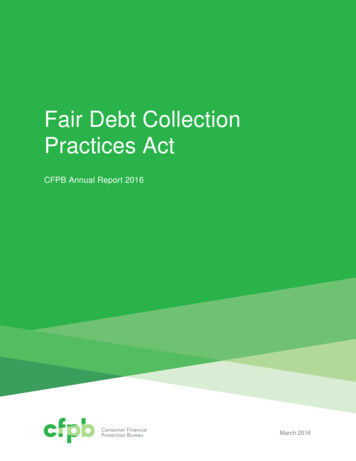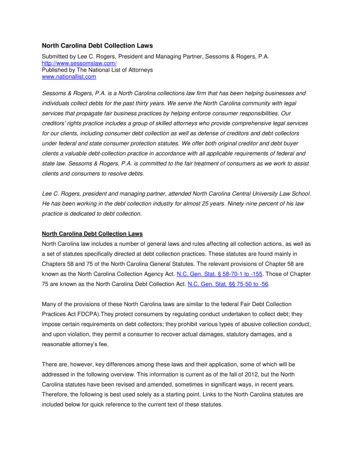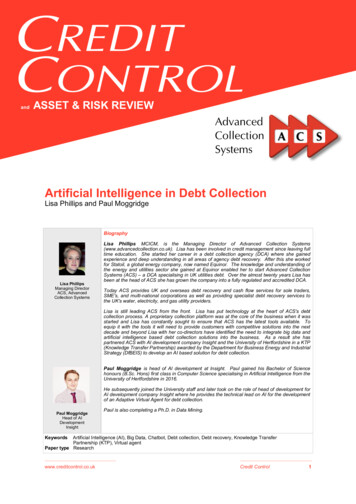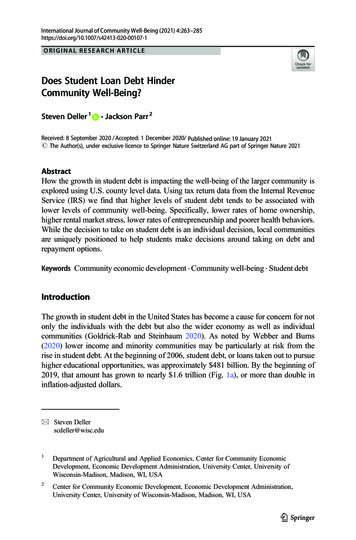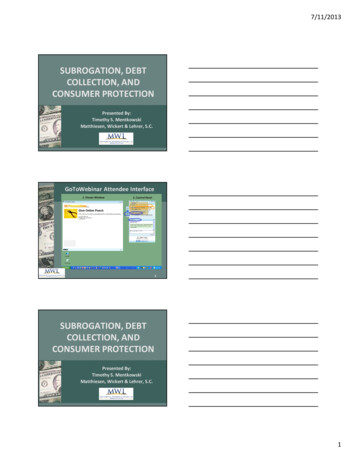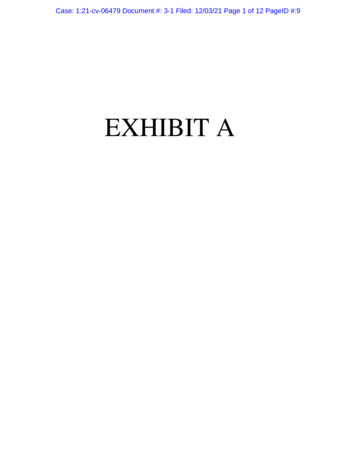
Transcription
THE FAIR DEBT COLLECTIONPRACTICES ACT:A PRIMERSponsor: Young Lawyers DivisionCLE Credit: 1.0Friday, June 15, 20189:00 a.m. - 10:00 a.m.Elkhorn A-DLexington Convention CenterLexington, Kentucky
A NOTE CONCERNING THE PROGRAM MATERIALSThe materials included in this Kentucky Bar Association Continuing LegalEducation handbook are intended to provide current and accurate information about thesubject matter covered. No representation or warranty is made concerning theapplication of the legal or other principles discussed by the instructors to any specificfact situation, nor is any prediction made concerning how any particular judge or jury willinterpret or apply such principles. The proper interpretation or application of theprinciples discussed is a matter for the considered judgment of the individual legalpractitioner. The faculty and staff of this Kentucky Bar Association CLE programdisclaim liability therefore. Attorneys using these materials, or information otherwiseconveyed during the program, in dealing with a specific legal matter have a duty toresearch original and current sources of authority.Printed by: Evolution Creative Solutions7107 Shona DriveCincinnati, Ohio 45237Kentucky Bar Association
TABLE OF CONTENTSThe Presenter . iThe Fair Debt Collection Practices Act: A Primer . 1Introduction . 1Elements of a FDCPA Claim . 1Damages for a Successful FDCPA Claim . 6What Does the FDCPA Prevent? . 7Specific Defenses to the FDCPA . 20Conclusion . 23
THE PRESENTERR. Brooks HerrickDinsmore & Shohl, LLP101 South Fifth Street, Suite 2500Louisville, Kentucky 40202R. BROOKS HERRICK is an associate in the Louisville office of Dinsmore & Shohl, LLPwhere he practices in the areas of commercial litigation and Fair Debt CollectionPractices Act litigation and compliance. Mr. Herrick received his B.A., summa cumlaude, from Bellarmine University and his J.D., summa cum laude, from the University ofKentucky College of Law where he was admitted to the Order of the Coif. Prior to joiningDinsmore & Shohl, he served as law clerk to Judge Joseph M. Hood of the United StatesDistrict Court for the Eastern District of Kentucky. Mr. Herrick serves as an online editorfor the Kentucky Law Journal and is a member of the Louisville and Kentucky BarAssociations and the Young Professionals Association of Louisville. He was named a2018 Kentucky Super Lawyers Rising Star in Creditor Debtor Rights.i
ii
THE FAIR DEBT COLLECTION PRACTICES ACT: A PRIMERR. Brooks HerrickI.INTRODUCTIONThe Fair Debt Collection Practices Act, 15 U.S.C. §1692 et seq. (the "FDCPA" orthe "Act") was originally enacted in 1977 to "eliminate abusive debt collectionpractices by debt collectors, to insure that those debt collectors who refrain fromusing abusive debt collection practices are not competitively disadvantaged, andto promote consistent State action to protect consumers against debt collectionabuses." 15 U.S.C. §1692(e). Put simply, "[t]he FDCPA is designed to protectagainst abusive debt collection practices which would likely disrupt a debtor'slife." Pettit v. Retrieval Masters Creditors Bureau, Inc., 211 F.3d 1057, 1059 (7thCir. 2000). Additionally, the FDCPA also attempts to avoid "imposingunnecessary restrictions on ethical debt collectors." Peter v. GC Services, L.P.,310 F.3d 344, 351-52 (5th Cir. 2002) (quoting S. Rep. No. 95-382, at 1-2,reprinted in 1977 U.S. Code Cong. & Admin. News 1695, 1696). To achievethese goals, the FDCPA "prohibits unfair or unconscionable collection methods,conduct which harasses, oppresses or abuses any debtor, and the making of anyfalse, misleading, or deceptive statements in connection with a debt, and itrequires that collectors make certain disclosures." Foti v. NCO FinancialSystems, Inc., 424 F.Supp.2d 643, 653 (S.D.N.Y. 2006) (quoting Acosta v.Campbell, No. 6:04 Civ. 761, 2006 U.S. Dist. LEXIS 4088, at *12 (M.D. Fla.2006)).This outline will provide an introduction to the FDCPA, including the elements ofan FDCPA claim, specific defenses to an FDCPA claim, and the damagesavailable to a successful consumer. This information should help identify whetheryour client is subject to the FDCPA, whether you are subject to the FDCPA, andwhether your client has a potential FDCPA claim.II.ELEMENTS OF A FDCPA CLAIMTo establish a claim under the FDCPA, a plaintiff must prove four distinctelements: (1) the plaintiff must be a "consumer;" (2) the "debt" must arise out oftransactions which are "primarily for personal, family, or household purposes;" (3)the defendant must be a "debt collector;" and (4) the defendant must haveviolated a provision of the FDCPA. See Wallace v. Washington Mutual Bank.,F.A., 683 F.3d 323, 326 (6th Cir. 2012).A.What is a "Consumer"?To assert a successful FDCPA claim, the plaintiff must first show that heor she is a "consumer." The FDCPA defines a "consumer" as "any naturalperson obligated or allegedly obligated to pay any debt." 15 U.S.C.§1692a. Thus, to be a "consumer" under the FDCPA, the plaintiff mustsimply be an individual that owes a "debt."1
B.What is a "Debt"?The second element of an FDCPA claim is that the consumer must owe a"debt." However, the FDCPA does not apply to all debts. Rather, theFDCPA defines "debt" such that the Act only applies to consumer debt.Specifically, "debt"means any obligation or alleged obligation of a consumerto pay money arising out of a transaction in which themoney, property, insurance, or services which are thesubject of the transaction are primarily for personal,family, or household purposes, whether or not suchobligation has been reduced to judgment.15 U.S.C. §1692a(5). In other words, the FDCPA is drafted so that theAct does not apply to commercial debts. See, e.g., Thomas v.Daneshgari, 997 F.Supp.2d 754, 763 (E.D. Mich. 2014) ("[T]he FDCPAdoes not apply to commercial debts.")If the debt owed consists of debt incurred for personal, family, orhousehold purposes, and business purposes, the consumer bears theburden of proof to show that the debt was incurred "primarily" forpersonal, family, or household purposes. See Voris v. Creditors Alliance,Inc., No. 05 C 6840, 2007 U.S. Dist. LEXIS 87413, at *17 (N.D. Ill. Nov.28, 2007) (explaining the consumer's FDCPA claim must be dismissedbecause the consumer fell "far short of proffering sufficient evidence thatthe . . . debt was primarily for [the consumer] as an individual and not forhis business").C.Who is a "Debt Collector"?An FDCPA claim will only lie if the claim is against an individual or entitythat meets the definition of a "debt collector." Kelly v. Montgomery Lynch& Assocs., No. 1:07-CV-919, 2008 U.S. Dist. LEXIS 30917, at *10 (N.D.Ohio Apr. 15, 2008) ("To be liable under the FDCPA, a defendant must bea 'debt collector' as defined in §1692a(6).")1.Who is a "debt collector"?The FDCPA defines a "debt collector" as:any person who uses any instrumentality ofinterstate commerce or the mails in any businessthe principal purpose of which is the collection ofany debts, or who regularly collects or attempts tocollect, directly or indirectly, debts owed or due orasserted to be owed or due another. . . . [T]he termincludes any creditor who, in the process ofcollecting his own debts, uses any name other thanhis own which would indicate that a third person iscollecting or attempting to collect such debts. For2
the purpose of [15 USCS §1692f(6)], such termalso includes any person who uses anyinstrumentality of interstate commerce or the mailsin any business the principal purpose of which isthe enforcement of security interests.15 U.S.C. §1692a(6). 12.Who is not a "debt collector"?Based on the language of §1692a(6), a person attempting tocollect his or her "own" debt, is not a "debt collector" under theAct. Lott v. HMP of Wood Cty., PLLC, No. 2:13-cv-463, 2013 U.S.Dist. LEXIS 84689, at *4 (S.D. Ohio June 17, 2013) ("TheFDCPA's definition of debt collector does not include a consumercreditor attempting to collect its own debt.") Stated differently, "acreditor is not a debt collector for the purposes of the FDCPA andcreditors are not subject to the FDCPA when collecting theiraccounts." Montgomery v. Huntington Bank, 346 F.3d 693, 699(6th Cir. 2003).1In addition to identifying who is a debt collector, the Act also excludes certain individuals fromthe definition of "debt collector." These individuals include:(A) any officer or employee of a creditor while, in the name of the creditor,collecting debts for such creditor;(B) any person while acting as a debt collector for another person, both of whomare related by common ownership or affiliated by corporate control, if the personacting as a debt collector does so only for persons to whom it is so related oraffiliated and if the principal business of such person is not the collection ofdebts;(C) any officer or employee of the United States or any State to the extent thatcollecting or attempting to collect any debt is in the performance of his officialduties;(D) any person while serving or attempting to serve legal process on any otherperson in connection with the judicial enforcement of any debt;(E) any nonprofit organization which, at the request of consumers, performsbona fide consumer credit counseling and assists consumers in the liquidation oftheir debts by receiving payments from such consumers and distributing suchamounts to creditors; and(F) any person collecting or attempting to collect any debt owed or due orasserted to be owed or due another to the extent such activity (i) is incidental to abona fide fiduciary obligation or a bona fide escrow arrangement; (ii) concerns adebt which was originated by such person; (iii) concerns a debt which was not indefault at the time it was obtained by such person; or (iv) concerns a debtobtained by such person as a secured party in a commercial credit transactioninvolving the creditor.15 U.S.C. §1692a(6)(A)-(F).3
The Act defines a "creditor" as "any person who offers or extendscredit creating a debt or to whom a debt is owed, but such termdoes not include any person to the extent that he receives anassignment or transfer of a debt in default solely for the purpose offacilitating collection of such debt for another." 15 U.S.C.§1692a(4). Thus, if the individual attempting to collect the debt isthe so-called "original creditor," a consumer cannot maintain anaction against that individual.Additionally, even if the person attempting to collect the debt is notthe "original creditor," the person is excluded from the definition of"debt collector" if the debt was transferred to that person beforethe consumer defaulted on the debt. See 15 U.S.C. §1692a(6)(F);Justice v. Ocwen Loan Servicing, LLC, No. 2:13-CV-00165, 2014U.S. Dist. LEXIS 15800, at *13 (S.D. Ohio Feb. 7, 2014) ("[I]fOcwen acquired the servicing for the loans before they were indefault, then it is not a debt collector under the FDCPA."). Thus,an FDCPA claim can only be made against a person attempting tocollect a consumer debt that was not originated by that person,and that was transferred to that person after the consumerdefaulted on the debt.3.Attorneys can be "debt collectors."Individuals not excluded from the definition of a "debt collector"include attorneys. In Heintz v. Jenkins, 514 U.S. 291 (1995), theU.S. Supreme Court was asked to determine whether an attorney"who regularly through litigation tries to collect consumer debts"was a "debt collector" as defined by the Act. Id. at 292. TheSupreme Court determined "that the Act applies to attorneys who'regularly' engage in consumer-debt-collection-activity, even whenthat activity consists of litigation." Id. at 299.The Supreme Court primarily based its decision on the fact thatthe plain language of the definition of "debt collector" included anattorney that regularly sought to collect consumer debts.Additionally, the FDCPA previously exempted attorneys from thedefinition of "debt collector," but Congress repealed thatexemption in its entirety. See id. at 294-95. The Supreme Courtrejected Jenkins's argument that making attorneys subject to theAct would result in FDCPA liability simply for losing a lawsuit,stating that "we do not see how the fact that a lawsuit turns outultimately to be unsuccessful could, by itself, make the bringing ofit" an act resulting in FDCPA liability. Id. at 295-96.After Heintz, Congress amended the FDCPA "to exempt any'formal pleading made in connection with a legal action' from theFDCPA's notice requirements. Simon v. FIA Card Services, N.A.,732 F.3d 259, 265 n.3 (3d Cir. 2013) (quoting 15 U.S.C.§1692e(11)). However, "Congress did not otherwise limit theFDCPA's applicability to lawyers using litigation to collect debts."4
Id. Thus, except for the notice exception, all activities to collect aconsumer debt by an attorney that "regularly" attempts to collectconsumer debt, including legal pleadings filed with a court, aresubject to the Act's requirements.Thus, the only question that remains is what amounts to "regular"collection of consumer debts that will subject an attorney to therequirements of the Act. The Sixth Circuit has held that for anattorney or law firm to be subject to the FDCPA "a plaintiff mustshow that the attorney or law firm collects debts as a matter ofcourse for its clients or some clients, or collects debts as asubstantial, but not principal, part of his or its general lawpractice." See Schroyer v. Frankel, 197 F.3d 1170, 1176 (6th Cir.1999). The Sixth Circuit also noted several factors that should beanalyzed to determine whether an attorney or law firm meets thisdefinition.[O]ther courts have relied upon a variety of factors,including the volume of the attorney's collectionactivities, the frequent use of a particular debtcollection document or letter, and whether thereexists a steady relationship between the attorneyand the collection agency or creditor herepresented. Courts have considered what portionof the overall caseload debt collection casesconstitute, and what percentage of revenues derivefrom debt collection activities. Some havemaintained that even where debt collection takesup a minor portion of a law practice, "debt collector"liability may lie where the defendant has an"ongoing relationship" with a client whose activitiessubstantially involve debt collection.Id. (citations omitted).Accordingly, if an attorney is determined to "regularly" collectconsumer debts, all actions taken by that attorney to collect aconsumer debt are subject to the requirements of the FDCPA, andcan subject an attorney to FDCPA liability.While it is clear litigation activity can result in FDCPA liability,courts have clarified that taking a legitimate legal position that isultimately wrong does not result in FDCPA liability. For example,in Miljkovic v. Shafritz & Dinkin, P.A., 791 F.3d 1291 (11th Cir.2015), a debt collector obtained a writ of garnishment against adebtor in state court. Id. at 1294. The consumer filed a claim ofexemption, and the collector filed a sworn reply disputing theconsumer's right to assert an exemption. Id. at 1295-96. Afterexchanging discovery, the debt collector voluntarily dismissed itsattempt at a garnishment. Id. at 1296. The consumer filed anFDCPA suit alleging the debt collector's sworn reply violated the5
FDCPA. The Eleventh Circuit affirmed the district court's dismissalof the consumer's claim stating "it would be passing odd to findthat allegations that a state court filing asserted a legal positioncontrary to that of the consumer was sufficient to state a claim." Id.at 1307.III.DAMAGES FOR A SUCCESSFUL FDCPA CLAIMIf an FDCPA lawsuit is successful, the FDCPA provides specific damages theconsumer may recover from the debt collector. Generally, the FDCPA allows forthe recovery of actual damages suffered as a result of the FDCPA violation,statutory damages up to 1,000, costs, and reasonable attorney's fees.Except as otherwise provided by this section, any debt collectorwho fails to comply with any provision of this title [15 USCS§§1692 et seq.] with respect to any person is liable to such personin an amount equal to the sum of—(1)any actual damage sustained by such person as a result ofsuch failure;(2)(A) in the case of any action by an individual, suchadditional damages as the court may allow, but notexceeding 1,000; or(B) in the case of a class action, (i) such amount for eachnamed plaintiff as could be recovered under subparagraph(A), and (ii) such amount as the court may allow for allother class members, without regard to a minimumindividual recovery, not to exceed the lesser of 500,000or 1 per centum of the net worth of the debt collector; and(3)in the case of any successful action to enforce theforegoing liability, the costs of the action, together with areasonable attorney's fee as determined by the court. On afinding by the court that an action under this section wasbrought in bad faith and for the purpose of harassment, thecourt may award to the defendant attorney's feesreasonable in relation to the work expended and costs.15 U.S.C. §1692k(a).In assessing statutory damages, the court awarding damages must consider "thefrequency and persistence of noncompliance by the debt collector, the nature ofsuch noncompliance, and the extent to which such noncompliance wasintentional." Id. at §1692k(b)(1). Statutory damages are limited to 1,000 "perproceeding," rather than 1,000 "per violation." Wright v. Finance Service ofNorwalk, Inc., 22 F.3d 647, 651 (6th Cir. 1994).When seeking actual damages, a consumer will frequently allege damages foranxiety, emotional suffering, embarrassment, and distress. If a court awards6
actual damages for emotional distress, it does so only where "the illegal debtcollection practice was extreme and outrageous." See, e.g., Foster v. D.B.S.Collection Agency, 463 F.Supp.2d 783, 806 (S.D. Ohio 2006). However, courtshave held that "bare allegations by a plaintiff that the defendant's conduct madehim 'depressed,' 'humiliated,' or the like are not sufficient to establish injuryunless the facts underlying the case are so inherently degrading that it would bereasonable to infer that a person would suffer emotional distress from thedefendant's action." Bassett v. I.C. Sys., No. 09-C-0301, 2010 U.S. Dist. LEXIS53697, at *18 (N.D. Ill. June 1, 2010).Punitive damages are not available for a violation of the FDCPA. See, e.g.,Boyce v. Attorney's Dispatch Serv., No. C-3-94-347, 1999 U.S. Dist. LEXIS12970, at *9-10 (S.D. Ohio Apr. 27, 1999) ("The Plaintiffs are not entitled torecover punitive damages under the FDCPA." (citations omitted)).In addition to the damages available to consumers, in rare circumstances, theAct allows a successful debt collector to recover its attorney's fees and costs. 15U.S.C. §1692k(a)(3). Specifically, the Act provides: "On a finding by the court thatan action under [the FDCPA] was brought in bad faith and for the purpose ofharassment, the court may award to the defendant attorney's fees reasonable inrelation to the work expended and costs." Id.IV.WHAT DOES THE FDCPA PREVENT?The FDCPA includes provisions that require a "debt collector" to take affirmativeactions and also that prevent a "debt collector" from taking certain actions. If adebt collector fails to comply with any of the requirements of the FDCPA, "theFDCPA imposes strict liability, therefore alleviating the need of the plaintiff toprove knowledge or intent, and actual damages need not be suffered." Perkins v.LVNV Funding, LLC (In re Perkins), 533 B.R. 242, 255 (W.D. Mich. Bankr. 2015).Accordingly, a plaintiff "need not show intentional conduct by the debt collector tobe entitled to intentional damages." Russell v. Equifax A.R.S., 74 F.3d 30, 33 (2dCir. 1996).A.The Least Sophisticated Consumer StandardIn most cases involving allegations of a violation of the FDCPA, butspecifically when a consumer alleges that a collection action wasmisleading or unfair, most courts including the Sixth Circuit apply the"least sophisticated consumer" standard to determine whether the debtcollector's actions violated the FDCPA. This standard is most oftenapplied to communications with consumers or legal pleadings filed inlitigation to collect a debt.The Sixth Circuit has explained the "least sophisticated consumer" test asfollows:The least-sophisticated-consumer test is objective and isdesigned "to ensure that the FDCPA protects allconsumers, the gullible as well as the shrewd. [A]lthoughthis standard protects naive consumers, it also prevents7
liability for bizarre or idiosyncratic interpretations ofcollection notices by preserving a quotient of reasonableness and presuming a basic level of understanding andwillingness to read with care.Kistner v. Law Offices of Michael P. Margelefsky, LLC, 518 F.3d 433,438-39 (6th Cir. 2008) (internal quotation marks omitted) (quoting F.Home Loan Mortg. Corp. v. Lamar, 503 F.3d 504, 509-10 (6th Cir. 2007)).In other words, courts "will not countenance lawsuits based on frivolousmisrepresentations or nonsensical interpretations of being led astray."Miller v. Javitch, Block & Rathbone, 561 F.3d 588, 592 (6th Cir. 2009).However, a minority of courts, including the Seventh Circuit, apply the"unsophisticated consumer standard." The Seventh Circuit rejected the"least sophisticated consumer" test because it believed this standardrequired a court to view the communication from the perspective of "thesingle most unsophisticated consumer who exists." Gammon v. GCServices Ltd. Partnership, 27 F.3d 1254, 1257 (7th Cir. 1994). Thus, theSeventh Circuit applies the unsophisticated consumer standard, which"protects the consumer who is uninformed, naïve, or trusting, yet it admitsan objective element of reasonableness. The reasonableness element inturn shields complying debt collectors from liability for unrealistic orpeculiar interpretations of collection letters." Id.B.Communications after Notice a Consumer is Represented by an Attorney15 U.S.C. §1692c(a)(2) prevents a debt collector from communicatingwith a consumer if the debt collector knows the consumer is representedby an attorney.Without the prior consent of the consumer given directly tothe debt collector or the express permission of a court ofcompetent jurisdiction, a debt collector may not communicate with a consumer in connection with the collectionof any debt . . . if the debt collector knows the consumer isrepresented by an attorney with respect to such debt andhas knowledge of, or can readily ascertain, such attorney'sname and address, unless the attorney fails to respondwithin a reasonable period of time to a communication fromthe debt collector or unless the attorney consents to directcommunication with the consumer.15 U.S.C. §1692c(a)(2).C.Communications with Third-Parties about a DebtThe FDCPA generally prevents a debt collector from communicating witha third-party about a consumer's debt.Except as provided in section 1692b of this title [whichgoverns acquisition of location information], without the8
prior consent of the consumer given directly to the debtcollector, or the express permission of a court of competent jurisdiction, or as reasonably necessary toeffectuate a postjudgment judicial remedy, a debtcollector may not communicate, in connection with thecollection of any debt, with any person other than theconsumer, his attorney, a consumer reporting agencyif otherwise permitted by law, the creditor, the attorneyof the creditor, or the attorney of the debt collector.15 U.S.C. §1692c(b) (emphasis added).For the purpose of §1692c only, "consumer" is defined to include "theconsumer's spouse, parent (if the consumer is a minor), guardian,executor, or administrator." 15 U.S.C. §1692c(d). Thus, a debt collectorcan communicate about a debt with a consumer's spouse, but a debtcollector cannot communicate about a consumer's debt with theconsumer's employer, children, or grandparents. See id.D.Harassing, Oppressive, or Abusive ActionsThe FDCPA provides that a debt collector "may not engage in anyconduct the natural consequence of which is to harass, oppress, or abuseany person in connection with the collection of a debt." 15 U.S.C. §1692d.The Act includes a non-exhaustive list of activities that are deemed to beharassing, oppressive, or abusive, which include:(1)The use or threat of use of violence or othercriminal means to harm the physical person,reputation, or property of any person.(2)The use of obscene or profane language orlanguage the natural consequence of which is toabuse the hearer or reader.(3)The publication of a list of consumers who allegedlyrefuse to pay debts, except to a consumer reportingagency or to persons meeting the requirements ofsection 603(f) or 604(3) [604(a)(3)] of this Act [15USCS §1681a(f) or 1681b(a)(3)].(4)The advertisement for sale of any debt to coercepayment of the debt.(5)Causing a telephone to ring or engaging anyperson in telephone conversation repeatedly orcontinuously with intent to annoy, abuse, or harassany person at the called number.9
(6)Except as provided in section 804 [15 USCS§1692b], the placement of telephone calls withoutmeaningful disclosure of the caller's identity.Id.The Sixth Circuit has explained that §1692d covers actions taken by debtcollectors that are intended to "embarrass, upset, or frighten a debtor.They are likely to cause the suffering and anguish which occur when adebt collector attempts to collect a money which the debtor, through nofault of his own, does not have." Harvey v. Great Seneca Financial Corp.,453 F.3d 324, 330 (6th Cir. 2006) (citations omitted). Based upon thesedefinitions, the Sixth Circuit determined that "the filing of a simple lawsuit,which is an authorized method of collecting a debt," did not violate§1692d because filing a simple lawsuit did "not concern coercion, scaretactics, or fraud." Id.E.False or Misleading RepresentationsOne of the most litigated sections contained within the FDCPA is 15U.S.C. §1692e, which prohibits a debt collector from using "false,deceptive, or misleading" representations or means in connection with thecollection of any debt. 15 U.S.C. §1692e. The Act includes a nonexhaustive list of means of collecting a debt that are considered "false,deceptive, or misleading":(1)The false representation or implication that the debtcollector is vouched for, bonded by, or affiliatedwith the United States or any State, including theuse of any badge, uniform, or facsimile thereof.(2)The false representation of—(A)the character, amount, or legal status of anydebt; or(B)any services rendered or compensationwhich may be lawfully received by any debtcollector for the collection of a debt.(3)The false representation or implication that anyindividual is an attorney or that any communicationis from an attorney.(4)The representation or implication that nonpaymentof any debt will result in the arrest or imprisonmentof any person or the seizure, garnishment,attachment, or sale of any property or wages of anyperson unless such action is lawful and the debtcollector or creditor intends to take such action.10
(5)The threat to take any action that cannot legally betaken or that is not intended to be taken.(6)The false representation or implication that a sale,referral, or other transfer of any interest in a debtshall cause the consumer to—(A)lose any claim or defense to payment of thedebt; or(B)become subject to any practice prohibitedby this title [15 USCS §1692 et seq.].(7)The false representation or implication that theconsumer committed any crime or other conduct inorder to disgrace the consumer.(8)Communicating or threatening to communicate toany person credit information which is known orwhich should be known to be false, including thefailure to communicate that a disputed debt isdisputed.(9)The use or distribution of any written communication which simulates or is falsely represented to bea document authorized, issued, or approved by anycourt, official, or agency of the United States or anyState, or which creates a false impression as to itssource, authorization, or approval.(10)The use of any false representation or deceptivemeans to collect or attempt to collect any debt or toobtain information concerning a consumer.(11)The failure to disclose in the initial written communication with the consumer and, in addition, if theinitial communication with the consumer is oral, inthat initial oral communication, that the debtcollector is attempting to collect a debt and that anyinformation obtained will be used for that purpose,and the failure to disclose in subsequent communications that the communication is from a debtcollector, except that this paragraph shall not applyto a formal pleading made in connection with alegal action.(12)The false representation or implication thataccounts have been turned over to innocentpurchasers for value.11
(13)The false representation or implication that documents are legal process.(14)The use of any business, company, or organizationname other than the true name of the debtcollector's business, company, or organization.(15)The false representation or implication that documents are not legal process forms or do not requireaction by the consumer.(16)The false representation or implication that a debtcollector operates or is employed by a consumerreporting agency as defined by section 603(f) ofthis A
The Fair Debt Collection Practices Act, 15 U.S.C. §1692 et seq. (the "FDCPA" or the "Act") was originally enacted in 1977 to eliminate abusive debt collection "practices by debt collectors, to insure that those debt collectors who refrain from using abusive debt collection practices are not competitively disadvantaged, and



